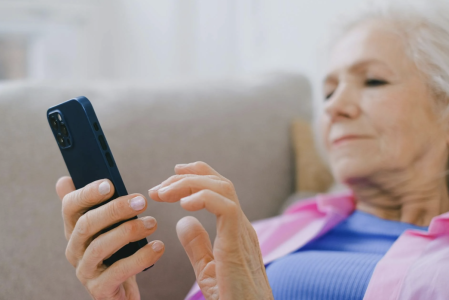Is your phone time creeping up? Half of boomers are using theirs more than 3 hours a day
By
Veronica E.
- Replies 0
We often associate phone overuse with younger generations—but new findings suggest that older adults are just as plugged in.
A recent survey found that half of baby boomers are spending over three hours a day on their smartphones, with some logging even more.
It’s easy to see how it happens: a quick scroll through family photos, checking the news, or playing a game can stretch into hours before we know it.
While smartphones can be helpful tools, they can also quietly take up more time than we intend.
So how do your habits compare?

More boomers are glued to their phones than you might think
A national survey from AddictionResource.net polled 2,000 Americans between ages 59 and 77—and the results defy old stereotypes.
Half of respondents admitted to spending more than three hours a day on their phones, and nearly 40% said they felt anxious when separated from their devices.
Another 50% check their phones within an hour of waking up.
The reasons vary—from staying in touch with family to managing appointments and reading news—but smartphones have clearly become a central part of everyday life, even for those who didn’t grow up with them.
Also read: Are you destroying your phone battery without realizing it? Here’s what experts say about charging to 100%
Connection or convenience—or something else?
According to counselor Ruth Hernandez, it’s not unusual for older adults to adopt the same tech habits as younger generations.
“They use their phones for just about everything now,” she said, pointing to social media, health apps, texting, and even streaming TV.
But HR consultant Bryan Driscoll sees a potential downside: for some, the screen time may reflect not just connection but also disconnection.
“It’s not always about staying connected,” he explained.
“Sometimes it’s about avoiding loneliness or boredom—and that can make people more vulnerable to online misinformation and isolation.”
Also read: Are you putting your health at risk every time you use your phone on the toilet? The disturbing reason you need to stop now
Benefits—and risks—of a digital lifestyle
There are plenty of upsides to having a smartphone at your fingertips.
They can keep you engaged, organized, and in touch with loved ones, especially if mobility is a challenge.
But experts warn that too much screen time can interfere with sleep, contribute to eye strain, and increase feelings of anxiety or isolation.
Health organizations generally recommend keeping recreational screen time under two hours per day.
And with scams and misinformation spreading fast online, it’s more important than ever to stay alert and informed.
Also read: Is your phone due for a digital detox? Experts say yes
Simple ways to set healthier phone habits
If your daily phone use is creeping up, the good news is that small changes can help.
Here are five easy ways to cut back:
Also read: Is your phone the key to detecting Parkinson’s or Dementia early? New tech now available across the US
The generation gap is narrowing
Boomers may not have grown up with smartphones, but they’ve embraced them—sometimes more than expected.
“Digital habits aren’t about age anymore,” Hernandez added.
“We’re all learning how to navigate this together.” Whether you’re FaceTiming grandkids or checking weather updates, your phone can be a great tool—just make sure it’s serving you, not the other way around.
Let’s face it—technology isn’t going anywhere, and neither are the screens in our lives.
But a little mindfulness can go a long way in making sure we’re using our time in ways that truly enrich us.
Read next: The risk of a common phone habit in the shower: A woman’s cautionary tale

Have you made changes to your phone habits lately? We’d love to hear what’s worked for you!
A recent survey found that half of baby boomers are spending over three hours a day on their smartphones, with some logging even more.
It’s easy to see how it happens: a quick scroll through family photos, checking the news, or playing a game can stretch into hours before we know it.
While smartphones can be helpful tools, they can also quietly take up more time than we intend.
So how do your habits compare?

Smartphones have become a regular part of daily life—especially for boomers staying connected, informed, and entertained. Image source: Pexels /
SHVETS production.
SHVETS production.
More boomers are glued to their phones than you might think
A national survey from AddictionResource.net polled 2,000 Americans between ages 59 and 77—and the results defy old stereotypes.
Half of respondents admitted to spending more than three hours a day on their phones, and nearly 40% said they felt anxious when separated from their devices.
Another 50% check their phones within an hour of waking up.
The reasons vary—from staying in touch with family to managing appointments and reading news—but smartphones have clearly become a central part of everyday life, even for those who didn’t grow up with them.
Also read: Are you destroying your phone battery without realizing it? Here’s what experts say about charging to 100%
Connection or convenience—or something else?
According to counselor Ruth Hernandez, it’s not unusual for older adults to adopt the same tech habits as younger generations.
“They use their phones for just about everything now,” she said, pointing to social media, health apps, texting, and even streaming TV.
But HR consultant Bryan Driscoll sees a potential downside: for some, the screen time may reflect not just connection but also disconnection.
“It’s not always about staying connected,” he explained.
“Sometimes it’s about avoiding loneliness or boredom—and that can make people more vulnerable to online misinformation and isolation.”
Also read: Are you putting your health at risk every time you use your phone on the toilet? The disturbing reason you need to stop now
Benefits—and risks—of a digital lifestyle
There are plenty of upsides to having a smartphone at your fingertips.
They can keep you engaged, organized, and in touch with loved ones, especially if mobility is a challenge.
But experts warn that too much screen time can interfere with sleep, contribute to eye strain, and increase feelings of anxiety or isolation.
Health organizations generally recommend keeping recreational screen time under two hours per day.
And with scams and misinformation spreading fast online, it’s more important than ever to stay alert and informed.
Also read: Is your phone due for a digital detox? Experts say yes
Simple ways to set healthier phone habits
If your daily phone use is creeping up, the good news is that small changes can help.
Here are five easy ways to cut back:
- Check your screen time stats: Most smartphones track how long you use them—look it up and set a realistic goal.
- Create phone-free spaces: Keep your phone away from the dinner table or bedside to improve real-world connection and sleep.
- Schedule in-person time: Whether it’s coffee with a friend or a weekly phone call, real interaction can be more fulfilling than digital ones.
- Stick to trusted sources: Be mindful of what you read or share online, especially when it comes to health and news.
- Swap screen time for hobbies: Replace some phone time with reading, walking, puzzles, or creative activities you enjoy.
Also read: Is your phone the key to detecting Parkinson’s or Dementia early? New tech now available across the US
The generation gap is narrowing
Boomers may not have grown up with smartphones, but they’ve embraced them—sometimes more than expected.
“Digital habits aren’t about age anymore,” Hernandez added.
“We’re all learning how to navigate this together.” Whether you’re FaceTiming grandkids or checking weather updates, your phone can be a great tool—just make sure it’s serving you, not the other way around.
Let’s face it—technology isn’t going anywhere, and neither are the screens in our lives.
But a little mindfulness can go a long way in making sure we’re using our time in ways that truly enrich us.
Read next: The risk of a common phone habit in the shower: A woman’s cautionary tale
Key Takeaways
- A new survey found that half of baby boomers are spending more than three hours a day on their phones.
- Many older adults now use smartphones for texting, health tracking, entertainment, and news—just like younger generations.
- Experts warn that excessive screen time can increase anxiety, impact sleep, and contribute to isolation if not used mindfully.
- Simple strategies like setting limits, taking breaks, and creating phone-free zones can help maintain a healthy balance.
Have you made changes to your phone habits lately? We’d love to hear what’s worked for you!






